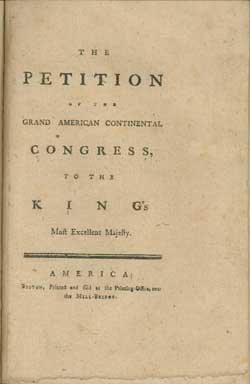The Petition of the Grand American Continental Congress, to the King's Most Excellent Majesty
To order an image, navigate to the full
display and click "request this image"
on the blue toolbar.
-
Choose an alternate description of this item written for these projects:
- Main description
[ This description is from the project: Coming of the American Revolution ]
This petition to King George III, signed jointly by twelve colonies, seeks "only to obtain redress of grievances and relief" from the perceived injustices imposed by Britain upon its colonies. This appeal to the King's sense of justice was an attempt at reconciliation between Britain and the colonies, proposed as an alternative to the more radical factions seeking complete independence.
A Humble Petition
The delegates from Massachusetts favor a bold response to the Coercive Acts, but representatives from other colonies (primarily New York, Pennsylvania, and Maryland) lean toward accommodation. On 28 September, Pennsylvanian James Galloway presents his plan of union, which calls for of an intercolonial legislature to be formed that will function as a branch of Parliament. Fearing that such an arrangement will make the colonists more subservient to Britain, Congress delays discussing Galloway's proposition. (Delegates eventually vote to delete all references to it from their minutes.) On 1 October, the Congress dismisses another conciliatory gesture, New Yorker John Jay's proposal to reimburse England for the tea destroyed in Boston Harbor in December 1773. Eventually, conservative elements prevail upon Congress to petition King George III. Approved by the body on 20 October, the petition, delegates hope, will win over the King.
Questions to Consider
1. List the grievances enumerated by the colonists in their petition to the King.
2. Who or what do the colonists blame for their current grievances?
3. How would you describe the tone of this petition? Use words and phrases from the document to support your answer.
4. On page 6, the Congress states, "silence would be disloyalty." What does this mean?
5. What are the colonists asking for? (See page 7 for a hint.)
Further Exploration
6. Read more about James Galloway's plan of union in your textbook, in an encyclopedia, or on the Internet. Why do you think the delegates vote to delete all references to the plan from their minutes?

